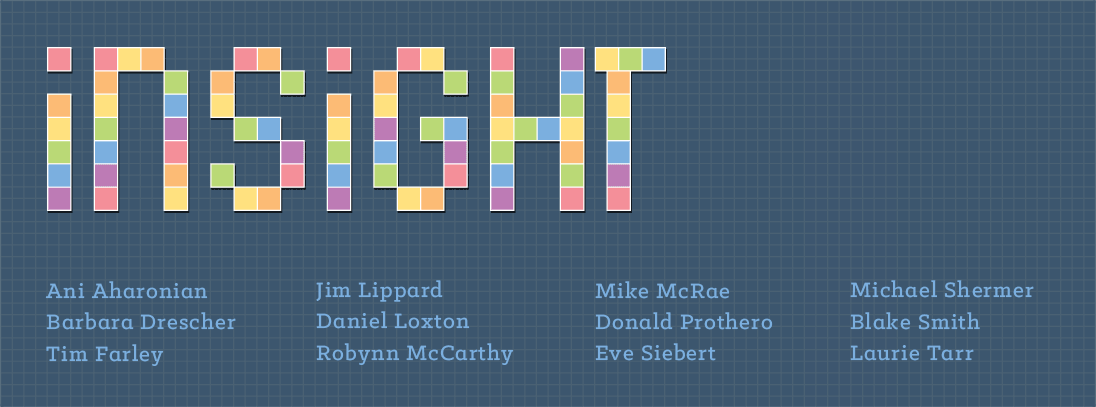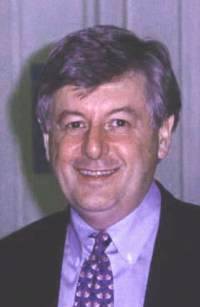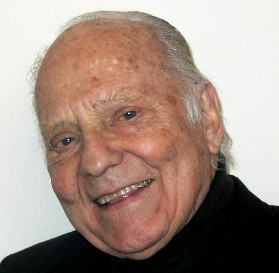
University of Southern California religion and gerontology professor emeritus Gerald A. Larue. Image provided by David Knight Larue
The Los Angeles Times noted yesterday evening that University of Southern California religion and gerontology professor emeritus Gerald A. Larue (b. June 20, 1916, d. September 17, 2014) has died at age 98. He was a long-time supporter of the Committee for Skeptical Inquiry and the Council for Secular Humanism, heading the latter’s Committee for the Scientific Examination of Religion from its founding in 1983 until handing over the reins to R. Joseph Hoffmann in 2003. Larue was also on the editorial board of Skeptic magazine from its founding in 1992 to its most recent issue.
Larue was the author of numerous books and articles on biblical history and archaeology, criticism of religion, and death and dying. He had been an ordained minister in the United Church of Canada, leading congregations from 1945 to 1953. In 1958 he joined the USC faculty as a professor of biblical history and archaeology, and joined the gerontology faculty in 1981, retiring in 2006. From 1980 to 1988, he was the first president of the Hemlock Society, a position he was asked to take after being the only other person at the organizing meeting besides founder Derek Humphry to be willing to join an organization that explicitly argued for the right to assisted suicide.
CONTINUE READING THIS POST…

Jim Lippard is a long-time skeptic who works in the information security field. He founded the Phoenix Skeptics in 1985, and has contributed to Skeptic, Reports of the National Center for Science Education, Skeptical Briefs, The Journal of the American Scientific Affiliation, Joe Nickell’s book Psychic Sleuths, and Gordon Stein’s Encyclopedia of the Paranormal. Read Jim’s full bio or his other posts on this blog.
I was excitedly booking airline tickets to Buenos Aires last week when the website prompted me to enter my passport information. “Passport… That’s in the…” But no memory came to mind easily, giving me pause as I tried in vain to recall the now distant memory of returning from my last vacation abroad in an attempt to retrace my steps or thoughts.
Misplacing things is somewhat of a routine annoyance for most of us. The experience is so common that I suspect many of us have more or less accepted that we will spend significant chunks of our lives searching for misplaced objects like mobile phones, keys, glasses, cars, etc. In these more common cases of lost objects, we typically misplace an object inadvertently. This is likely due to inattention. For example, we’re preoccupied with something else at the moment we walk in the door and are not paying attention to where we set down our keys.
These are not the types of misplaced objects I’m going to focus on, though. There is an even more frustrating subclass of misplaced objects: those misplaced as a result of intentional placement.
CONTINUE READING THIS POST…

Ani Aharonian is a cognitive psychologist and PhD student at the University of Nebraska, Lincoln, where she has focused on cognition and the intersection of law and psychology, specifically eyewitness identifications and testimony, memory, and learning. She currently works as an institutional researcher at Santa Monica College where she helps support and promote evidence-based approaches to planning and assessment. Read Ani’s full bio or her other posts on this blog.
Paul Frampton
fell for a “honeytrap”*. A divorced man of 68, he had begun corresponding online with a woman named
Denise Milani in November of 2011. Milani was a bikini model in her early 30s. Although he had never spoken with her over the phone or Skype, in January of 2012 he set out to meet her in Bolivia, where she was doing a photo shoot. Two weeks later he was sitting in a jail in Buenos Aries, arrested for transporting two kilos of cocaine into the country.
Here is what happened in a nutshell: Frampton was sent a ticket from Chapel Hill, North Carolina to Bolivia, by way of Toronto. When he got to Toronto, he discovered that the ticket for the second leg was invalid. So he waited in Toronto for another ticket. Four days later, he arrived in Bolivia, but Milani was no longer there. She was in Brussels on another photo shoot. She would send him a ticket, but would he mind bringing her a bag she’d left in Bolivia?
CONTINUE READING THIS POST…

Barbara Drescher taught quantitative and cognitive psychology, primarily at California State University, Northridge for a decade. Barbara was a National Science Foundation Fellow and a Phi Kappa Phi Scholar. Her research has been recognized with several awards and the findings discussed in Psychology Today. More recently, Barbara developed educational materials for the James Randi Educational Foundation. Read Barbara’s full bio or her other posts on this blog.
Victor J. Stenger was a particle physicist, philosopher, author, skeptic, and friend. I first came across his name shortly after we founded Skeptic magazine in 1992 when I read his 1990 book Physics and Psychics: The Search for a World Beyond the Senses (Prometheus Books), for which “psychic” Uri Geller sued (the case was dismissed and Geller was ordered to pay legal fees of nearly $50,000). Stenger’s 1995 book, The Unconscious Quantum: Metaphysics in Modern Physics and Cosmology, was especially helpful to us as we dealt with the burgeoning interest in the topic of quantum consciousness and the New Age fascination with the field as a way of using one of the most well-developed and thoroughly tested fields in all of science to prop up supernatural and paranormal beliefs with sciency sounding terms (the very definition of pseudoscience).
Victor was especially helpful to me in assessing the technical claims of the quantum consciousness proponents, such as those featured in the wildly popular film What the Bleep Do We Know?! It was a well produced film (I saw it in Portland with the producers after we were both on a radio show), but I never imagined it would become the big hit it did, given the esoteric nature of its subject: quantum physics and consciousness. But it had that New Agey uplifting anything-is-possible-if-you-wish-it-so feel. It included a number of talking head physicists, such as University of Oregon quantum physicist Amit Goswami, who proclaimed: “The material world around us is nothing but possible movements of consciousness. I am choosing moment by moment my experience. Heisenberg said atoms are not things, only tendencies.” In my Scientific American column on the film I challenged him to “leap out of a 20-story building and consciously choose the experience of passing safely through the ground’s tendencies.”
CONTINUE READING THIS POST…

Dr. Michael Shermer is the Publisher of Skeptic magazine, a monthly columnist for Scientific American, an Adjunct Professor at Claremont Graduate University and Chapman University, and the author of The Believing Brain, Why People Believe Weird Things, Why Darwin Matters, The Mind of the Market, How We Believe, and The Science of Good and Evil. His new book is The Moral Arc: How Science and Reason Lead Humanity Toward Truth, Justice, and Freedom. Read Michael’s other posts on this blog.
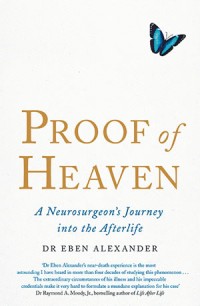 It has been two years now since the best-seller lists in the “Non-Fiction” category were dominated by books claiming that the writer visited heaven, and then returned to write a book about it. The most famous was Dr. Eben Alexander’s tale, Proof of Heaven: A Neurosurgeon’s Journey into the Afterlife, which was released in October 2012, featured on Dr. Oz, on Larry King Live, on Oprah and on the cover of Newsweek. It sold over two million copies and had been on the best-seller list for 35 weeks as of July 2013; more recent sales figures are not available, but it is no longer near the top of the best-seller list. But almost two years since the book came out, a lot of interesting facts have emerged that make the book seem less like a non-fictional account of heaven, and more like a convenient fiction to get a doctor in trouble out of his predicament and at the same time, make him filthy rich and immune to the criticism of the scientific and medical community. Now he has a website to suck in more readers, and is bragging about his next book to come out soon, called Map of Heaven.
It has been two years now since the best-seller lists in the “Non-Fiction” category were dominated by books claiming that the writer visited heaven, and then returned to write a book about it. The most famous was Dr. Eben Alexander’s tale, Proof of Heaven: A Neurosurgeon’s Journey into the Afterlife, which was released in October 2012, featured on Dr. Oz, on Larry King Live, on Oprah and on the cover of Newsweek. It sold over two million copies and had been on the best-seller list for 35 weeks as of July 2013; more recent sales figures are not available, but it is no longer near the top of the best-seller list. But almost two years since the book came out, a lot of interesting facts have emerged that make the book seem less like a non-fictional account of heaven, and more like a convenient fiction to get a doctor in trouble out of his predicament and at the same time, make him filthy rich and immune to the criticism of the scientific and medical community. Now he has a website to suck in more readers, and is bragging about his next book to come out soon, called Map of Heaven.
The basic story is that Alexander, a neurosurgeon, was infected by a virulent strain of bacterial meningitis and was put in intensive care for seven days in 2008. Doctors also used drugs to induce a coma, which shuts down part of the brain. After his infection had subsided, he awoke from his coma, sure that he had experiences of heaven. He gave an elaborate account of it which takes up most of the book, complete with descriptions of millions of butterflies, and seeing his late sister in a peasant dress and having a conversation with her. He asserts that he was medically dead during this time, that his cerebral cortex was shut down, and that he miraculously came back to life with a memory of a pleasant short trip to celestial paradise.
CONTINUE READING THIS POST…
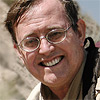
Dr. Donald Prothero taught college geology and paleontology for 35 years, at Caltech, Columbia, and Occidental, Knox, Vassar, Glendale, Mt. San Antonio, and Pierce Colleges. He earned his B.A. in geology and biology (highest honors, Phi Beta Kappa, College Award) from University of California Riverside in 1976, and his M.A. (1978), M.Phil. (1979), and Ph.D. (1982) in geological sciences from Columbia University. He is the author of over 35 books. Read Donald’s full bio or his other posts on this blog.

The 1976 founding issue of The Zetetic, now known as the Skeptical Inquirer.
In May 1976, the first major modern skeptical organization in the United States was formed at a special meeting of the American Humanist Association (AHA). The Committee for the Scientific Investigation of Claims of the Paranormal (CSICOP, now known as the Committee for Skeptical Inquiry, or CSI) was established under the joint leadership of co-chairmen Paul Kurtz, a philosopher at the State University of New York at Buffalo and editor of AHA’s The Humanist magazine, and Marcello Truzzi, a sociologist at Eastern Michigan University. The two co-chairmen had different ideas about what the goals of the organization should be—Paul Kurtz wanted to publish a popular magazine and respond to a “rising tide of irrationality” exemplified by a high rate of belief in astrology, while Truzzi wanted to publish an academic journal that was open to both proponents and critics of paranormal claims.
CONTINUE READING THIS POST…

Jim Lippard is a long-time skeptic who works in the information security field. He founded the Phoenix Skeptics in 1985, and has contributed to Skeptic, Reports of the National Center for Science Education, Skeptical Briefs, The Journal of the American Scientific Affiliation, Joe Nickell’s book Psychic Sleuths, and Gordon Stein’s Encyclopedia of the Paranormal. Read Jim’s full bio or his other posts on this blog.
GUEST POST
If you look at the science education standards of any state, every one of them will proclaim the importance and value of students developing critical thinking skills. We all know someone who, shall we say, may not be the best critical thinker—but it’s a safe bet that each of them thinks their decision-making processes are just fine, thank you, and of course we should all be critical thinkers.
So who needs science and critical thinking? Obviously everyone.
Hardly a week goes by without a statement from some congressional representative or from the White House that science is essential to American prosperity, well-being, competitiveness, and security. And you cannot turn on the television or pick up a newspaper (yes, there still are newspapers) without being reminded about some discovery concerning food production, medicine, energy generation, or the environment that has its feet firmly rooted in the process and theories of science.
CONTINUE READING THIS POST…

Dr. Eugenie Scott is the former Executive Director of the National Center for Science Education, Inc., a not for profit membership organization of scientists, teachers, and others that works to improve the understanding of science as a way of knowing, the teaching of evolution, and the teaching of climate change. A former college professor, Dr. Scott is an internationally-known expert on the creationism and evolution controversy, and is called upon by the press and other media to explain science to the general public. The author of Evolution vs. Creationism: An Introduction and co-editor with Glenn Branch of Not in Our Classrooms: Why Intelligent Design is Wrong for our Schools, she is the recipient of numerous awards from scientists, educators, and skeptics, and has been awarded eight honorary degrees.
“Next time you catch a taxi, and you’re talking about your day,” said my old boss. “Tell them our story. Tell them about how we developed the polymer bank notes, or about our role in developing wi-fi. Tell them about the exciting research we’re doing in astronomy, or in healthcare.”
The intention was for us to play our role in advertising the relevance of this prominent Australian research organisation to the average person, of course. Market research indicated that in spite of being relatively well known as far as Australian science research went, brand recognition was underwhelming in some key demographics. Primarily among the younger generations. Sharing our organisation’s stories with random strangers was a personal way we employees could all do our bit.
If we were selling merchandise in a free market, advertising a brand would be par for the course. Selling science, however, isn’t quite the same thing, is it?
CONTINUE READING THIS POST…

Mike McRae is an Australian science writer and teacher. He has worked for the CSIRO’s education group and developed resources for the Australian government, promoting critical thinking and science education through educational publications. His 2011 book Tribal Science: Brains, Beliefs and Bad Ideas explored humanity’s development to think scientifically—and pseudoscientifically—about the universe. Read Mike’s other posts on this blog.
As I write this, this new Skeptic blog doesn’t even have an official name yet. [Now “INSIGHT.”] But when a computer programmer wants to learn a new programming language, it is traditional to start by making a simple program that spits out the words, “Hello, World!” I’ve always felt a cheerful thrill when taking on such a daunting task as learning a new computer language, and I feel similarly about this blog.
Writing a blog is similar to writing a computer program. You start off with some idea and as you consider it, you can see it form into its core components: beginning, middle, end. The longer you consider it, mentally model it, and refine it, the more it seems a good thing. The more it seems like it’s elegant, possibly even important? Yes, that’s it! You’ve really got it now and all that remains is to type it in. And then…
CONTINUE READING THIS POST…

Blake Smith is the producer and host of MonsterTalk, an official podcast of Skeptic magazine. He’s had a lifelong interest in science and the paranormal and enjoys researching the strange and unusual. By day he’s a computer consultant and by night he hunts monsters. He is married and has children. Puns are intentional; don’t bother alerting the management. Read Blake’s other posts on this blog.
There are few things so central to the projects of scholarly, journalistic, and scientific truth-seeking than conversation. Talking things out is humanity’s greatest superpower. It is the true telepathy—a way for one mind to reach out and attempt to understand another.
With the fruitful alchemy of conversation in mind, we’re pleased to allow comments on most posts at INSIGHT at Skeptic.com. We invite and encourage civil discussion, scholarly debate, and open exchanges of ideas.
To that end, comments on blog posts at Skeptic.com are moderated, and should be considered a privilege. If you choose to submit comments, please remember:
- Comments should be polite, charitable, on-topic, and reasonable.
- Comments should not be abusive, disruptive, libelous, annoying, or spam.
- Comments judged to be inappropriate will be deleted. Commenters who abuse the comments policy in any manner may be banned.
- Commenters are encouraged (though not required) to engage in discussion under their own names.
CONTINUE READING THIS POST…

Daniel Loxton is the Editor of INSIGHT at Skeptic.com and of Junior Skeptic, the 10-page kids’ science section bound within Skeptic magazine. Daniel has been an avid follower of the paranormal literature since childhood, and of the skeptical literature since his youth. He is also an award-winning author. Read Daniel’s full bio or his other posts on this blog.
Hello! I’d like to welcome you to the Skeptics Society’s new group blog dedicated to science and skepticism, INSIGHT at Skeptic.com. This brand new platform will feature news, commentary, and informed perspective regarding fringe claims, paranormal mysteries, mainstream science, and the ethos and history of skepticism itself.
Joining me in this new venture are some of the most passionate and knowledgable voices to speak within the tradition of scientific skepticism today:
- Ani Aharonian, a cognitive psychologist and PhD student at the University of Nebraska, Lincoln, and an institutional researcher at Santa Monica College;
- Barbara Drescher, a long-time former university instructor of quantitative and cognitive psychology, blogger at ICBS Everywhere, regular contributor to the podcast Skepticality and the weekly streaming video program The Virtual Skeptics;
- Tim Farley, a computer security analyst, creator of the What’s the Harm? website and the Skeptical Software Tools blog, and co-host of The Virtual Skeptics;
- Jim Lippard, a skeptical writer for decades who works in the information security field, blogger, a founder of the Phoenix Skeptics (in 1985), and a founding member of the Phoenix Area Skeptics Society (in 2012);
- Robynn “Swoopy” McCarthy, the founding co-host of the pioneering, original skeptics podcast, Skepticality—The Official Podcast of Skeptic Magazine;
- Mike McRae, an Australian educator, science writer, and author of Tribal Science;
- Dr. Donald Prothero, a paleontologist who has taught college geology and paleontology for decades at schools including Caltech and Columbia, and author of over 35 science books (and over 300 scientific papers);
- Dr. Michael Shermer, a Scientific American columnist, historian, author of numerous books, and Editor and founding publisher of Skeptic magazine;
- Dr. Eve Siebert, a blogger at Skeptical Humanities and co-host of The Virtual Skeptics;
- Blake Smith, the producer and host of MonsterTalk, an official podcast of Skeptic magazine;
- Laurie Tarr, a technical writer and co-founder of the Louisville Area Skeptics;
- and finally, yours truly.
CONTINUE READING THIS POST…

Daniel Loxton is the Editor of INSIGHT at Skeptic.com and of Junior Skeptic, the 10-page kids’ science section bound within Skeptic magazine. Daniel has been an avid follower of the paranormal literature since childhood, and of the skeptical literature since his youth. He is also an award-winning author. Read Daniel’s full bio or his other posts on this blog.
← PREVIOUS


